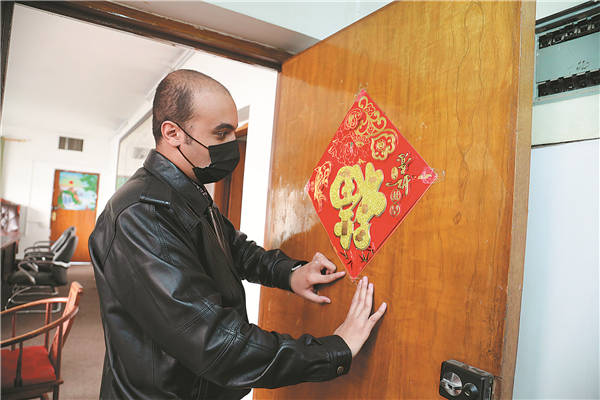

Before the Chinese Lunar New Year, Iraqi lover of Chinese culture Mohammed Talib endured the hardships of traveling from his hometown in southern Iraq to the capital Baghdad to celebrate Spring Festival with his Chinese friends.
Talib, also known by his Chinese friends and on some of his social media accounts as Mu Zhiyan, hung a Chinese lantern at the house of his host and stuck a Chinese calligraphy fu on his door to offer a blessing and express his wishes of happiness to all Chinese during the festival, despite having never visited China.
He was born in the city of Samawah on Jan 28, 1998-the day of Spring Festival in the Year of the Tiger. He developed a love for China around the age of 5 after receiving a toy and being told it was made in China. When he started school, he began reading everything he could about China and its culture.
As a child, he was fond of watching the TV series Romance of the Three Kingdoms, and while he was studying in Russia and socializing with Chinese students there, he learned Chinese from them, soon becoming fluent.
"This year is the Year of the Ox, and the next year will be tiger, and for the coming year I will wear red clothes," says Talib, referring to one of the luckiest colors in Chinese culture, which stands for prosperity, loyalty, success and happiness.
Like Chinese young men, Talib's mobile phone contains several Chinese apps, such as short-video platforms Douyin and Kuaishou, as well as WeChat and Alipay.
Sinophile Talib has many Chinese friends on social media, and he also "loves to eat Chinese food, hot pot, spicy strips and hot dry noodles".
Talib, who is also an Iraqi internet celebrity, changed some of his profiles on his social media accounts to display the Year of the Ox and a 360-degree night view of the Chinese city of Chongqing.
Making use of his Chinese language skills, he has published many short videos about China on social media, varying from the construction of bridges and high-speed railways, China's National Day and Chinese New Year to coronavirus vaccines.
Talib's social media accounts have garnered a lot of attention and user engagement. He says he gets into discussions about real life in China, which is very different from the image shown in Western media.
He has used all his experience to respond to the distortion of China's image on social platforms and the prejudice of foreign media against China.
After the outbreak of COVID-19 in China, Talib felt that he needed to stand with the country he loves, so he used his savings to purchase masks and sent them via his Chinese friends to China.
As part of his response to negative posts and news reports about China, he produced a video for which he spent five days translating an Arabic song If People Want Life into Chinese, accompanied by pictures of two hospitals that were built in Wuhan in record time during the height of the Hubei provincial capital's battle against the pandemic.
Li Hualai, a Chinese teacher who teaches at the Chinese department of Salahudin University in Iraq, says he is deeply impressed by Talib, who became an "internet celebrity" in the Arabic language community, promoting Chinese culture, as well as attempting to combat the distortion of China's image by the Western media.
Talib says once the pandemic is brought under control, he can go to China to study the language further.
"Studying Chinese at a Chinese university is a dream that never leaves my mind, and I hope that this dream will come true," he says.
Li says, "I hope that his desire will be fulfilled soon, and I also hope that more Iraqi youths will learn about Chinese culture and language and become messengers of cultural communication between China and Iraq."